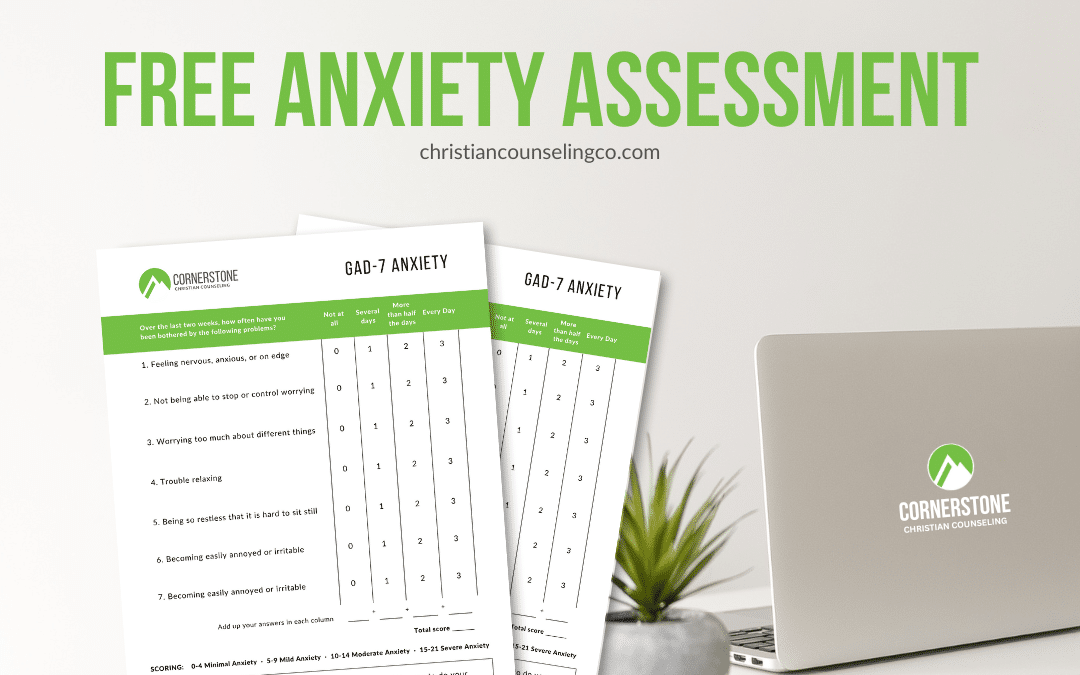Are you constantly worrying about things outside of your control? Do you consider yourself to have chronic anxiety? Are you sick of it and don’t know how to start healing? You’re in good company.
Anxiety really is a common mental health condition, and impacts millions of people across the globe. It’s caused by a variety of factors, including genetics, environmental factors, and life experiences. While some level of anxiety is normal, it can become problematic when it starts to interfere with daily life. But how can you tell if your anxiety is getting out of control?
Enter self-assessments for anxiety. These handy tools are a great way to evaluate the severity of anxiety symptoms and determine if professional help from a clinically excellent Christian counselor is needed. And the best part? You can take them from the comfort of your own home, without having to schedule an appointment or even put on pants (if that’s your thing).
But let’s be real, talking about anxiety can be overwhelming and scary. We’re here to guide you through this process with compassion while helping you navigate the journey toward the fulfilling life Jesus died to give you.
Together, we’ll explore 4 self-assessments for anxiety:
- Generalized Anxiety Disorder Screener (GAD-7)
- Hamilton Rating Scale for Anxiety (HAM-A)
- Zung Self-Rating Anxiety Scale (SAS)
- CAGE Assessment
We’ll discuss what each assessment evaluates, how to interpret the results, and what to do when you’re ready for professional help.
Let’s take a deep breath together and begin this journey toward understanding and managing your anxiety. Remember, you’re not alone, and there is help available.
4 Self-Assessments for Anxiety:
Generalized Anxiety Disorder Screener (GAD-7)
A self-assessment for anxiety used to diagnose generalized anxiety disorder. This tool consists of seven questions that ask about the frequency and severity of anxiety symptoms such as restlessness, difficulty concentrating, and worrying. The GAD-7 generates a score that indicates the severity of generalized anxiety disorder, with scores ranging from 0 to 21. A score of 10 or higher indicates moderate to severe anxiety and may require professional help.
Hamilton Rating Scale for Anxiety (HAM-A)
One of the first self-assessments for anxiety, the HAMA-A measures the intensity and severity of anxiety symptoms. The Hamilton Rating Scale consists of 14 questions that evaluate symptoms such as tension, apprehension, and insomnia. The score ranges from 0 to 56, with higher scores indicating more severe anxiety symptoms.
Zung Self-Rating Anxiety Scale (SAS)
Coming in at 20 questions long, the SAS is one of the longer self-assessments for anxiety on this list. It is a tool used to evaluate anxiety and stress symptoms, such as tension, trembling, and sweating. The Zung Scale generates a score that indicates the severity of anxiety symptoms, with scores ranging from 20 to 80. Higher scores indicate more severe symptoms.
CAGE Assessment
While the CAGE Assessment (or CAGE Questionnaire) is primarily used to evaluate alcohol use disorder, it can also be useful in identifying anxiety symptoms. The CAGE Assessment consists of just four questions that evaluate symptoms such as feeling guilty or worried after drinking. While not specifically designed to evaluate anxiety, the CAGE Assessment can be a useful tool in identifying symptoms that may be related to anxiety.
Take the CAGE Self-Assessment for Anxiety (and Substance Abuse)
Self-assessments for anxiety are valuable tools for identifying and evaluating anxiety symptoms. However, these resources should not be used as a substitute for professional diagnosis or treatment. If you are experiencing persistent or severe anxiety symptoms, it is important to seek help immediately!
FIND A CHRISTIAN THERAPIST
Research shows that much of the change people experience during their time in therapy is because they felt heard and understood by their therapist–that their therapist “got them” and that the guidance they gave was relevant and applicable. Because of this, it is critical that you find a therapist whom you can connect with, whom you feel comfortable with, whom you feel “gets you.” Therefore, we encourage you to take a few minutes to read a little about each one of our therapists. If you prefer to look at the counselors nearest to you, please click the office location buttons below. Otherwise, you can meet with any of our Christian Counselors online from the comfort of your own home. If you have questions about any of them, please contact us!












